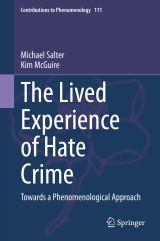Details

The Lived Experience of Hate Crime
Towards a Phenomenological ApproachContributions To Phenomenology, Band 111
|
CHF 106.50 |
|
| Verlag: | Springer |
| Format: | |
| Veröffentl.: | 05.12.2019 |
| ISBN/EAN: | 9783030338886 |
| Sprache: | englisch |
Dieses eBook enthält ein Wasserzeichen.
Beschreibungen
<p></p><p>This book approaches the topic of the subjective, lived experience of hate crime from the perspective of Husserlian phenomenology. It provides an experientially well-grounded account of how and what is experienced as a hate crime, and what this reveals about ourselves as the continually reconstituted “subject” of such experiences. </p><p>The book shows how qualitative social science methods can be better grounded in philosophically informed theory and methodological practices to add greater depth and explanatory power to experiential approaches to social sciences topics. The Authors also highlight several gaps and contradictions within Husserlian analyses of prejudice, which are exposed by attempts to concretely apply this approach to the field of hate crimes.</p><p>Coverage includes the difficulties in providing an empathetic understanding of expressions of harmful formsof prejudice underlying hate crimes, including hate speech, arising from our own and others’ ‘life worlds’. The Authors describe a ‘Husserlian-based’ view of hate crime as well as a novel interpretation of the value of the comprehensive methodological stages pioneered by Husserl. </p><p> </p><p>The intended readership includes those concerned with discrimination and hate crime, as well as those involved in qualitative research into social topics in general. The broader content level makes this work suitable for undergraduate and postgraduate students, even professionals within law enforcement.</p><p></p>
<p>Chapter 1: Introducing A Critical Form of Experiential Methodology For Hate Crime Research: Preliminary Stages.- Chapter 2: Descriptive Analysis of Constituted Meanings (Noematic Analysis).- Chapter 3: Eidetic Analysis.- Chapter 4: Analysis of Different Types of Interpretive Act (Noetic Analysis).- Chapter 5: Ecological Analysis</p>
<div><div>Michael Salter, Professor of Law, University of Central Lancashire teaches on European and International Human Rights (LLM), Legal Research Methods/Methodology (LLM), International Criminal Law, War Crimes Trials: Law and Policy, Thinking and Arguing about Law, Law and Moral Dilemmas. His research interests include Legal reasoning skills and rhetoric: the pervasive and double-edged role played by various linguistic and rhetorical devices in legal reasoning, especially metaphors, in judicial creativity (Salter and Culley 2005 Of particular interest he has focused upon the importance for legal researchers of cross referencing formal legal categories to the actual concrete lived-experience of those involved in law and affected by its practices (various articles on phenomenology from mid-1980’s onwards). </div><div><br></div><div>Kim McGuire, PhD, Senior Lecturer in Law, has focused her research upon the creation and effect of cognitive interpretations, with particular regard to improvement in legal approaches. Her work draws upon her background in History, English Literature and Law. In recent years she has focused upon perceptions and the law concerning ‘hate crime’ in the EU. Kim teaches criminal law and criminology. Areas of interest: perceptions of Law in action, utilising Linguistic, psychological, philosophical, socio-economic and historical perspectives.</div></div><div><br></div>
<p></p><p>This book approaches the topic of the subjective, lived experience of hate crime from the perspective of Husserlian phenomenology. It provides an experientially well-grounded account of how and what is experienced as a hate crime, and what this reveals about ourselves as the continually reconstituted “subject” of such experiences.</p><p>The book shows how qualitative social science methods can be better grounded in philosophically informed theory and methodological practices to add greater depth and explanatory power to experiential approaches to social sciences topics. The Authors also highlight several gaps and contradictions within Husserlian analyses of prejudice, which are exposed by attempts to concretely apply this approach to the field of hate crimes.</p><p>Coverage includes the difficulties in providing an empathetic understanding of expressions of harmful formsof prejudice underlying hate crimes, including hate speech, arising from our own and others’ ‘life worlds’. The Authors describe a ‘Husserlian-based’ view of hate crime as well as a novel interpretation of the value of the comprehensive methodological stages pioneered by Husserl.</p><p></p><p>The intended readership includes those concerned with discrimination and hate crime, as well as those involved in qualitative research into social topics in general. The broader content level makes this work suitable for undergraduate and postgraduate students, even professionals within law enforcement.</p><p></p>
The first book to provide a systematic analysis of Husserlian phenomenology as an approach to the lived experience of hate crime The only volume dealing with the what, how and for-whom levels of the lived experience of hate crime, whilst showing how the lived body mediates each of these experiential levels Makes a series of critical yet constructive points to further the claims of Husserlian phenomenology to be a relevant social scientific perspective
<p>The first book to provide a systematic analysis of Husserlian phenomenology as an approach to the lived experience of hate crime </p><p>The only volume dealing with the what, how and for-whom levels of the lived experience of hate crime, whilst showing how the lived body mediates each of these experiential levels </p><p>Makes a series of critical yet constructive points to further the claims of Husserlian phenomenology to be a relevant social scientific perspective </p>
Diese Produkte könnten Sie auch interessieren:

Karl Schuhmann, Selected papers on phenomenology

von: Karl Schuhmann, Cees Leijenhorst, Piet Steenbakkers

CHF 177.00















